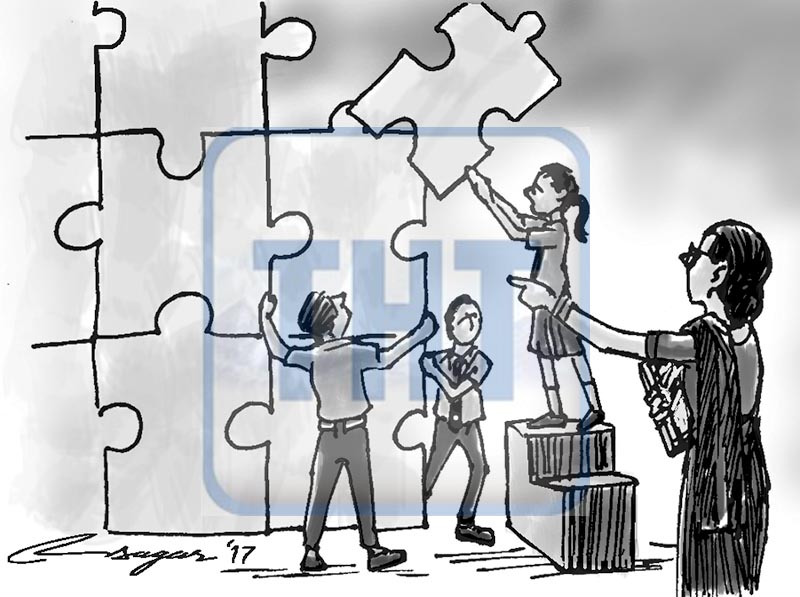All-round education: What makes someone educated?
Education is a balance of knowledge and wisdom. One ought to be mindful that knowledge without wisdom is more or less like a driver without control, which could lead to disaster
What is life-relevant education? This question has struck every human mind since long.
Firstly we should try to define education. Whom do we really address as the educated? What kind of education system is relevant to daily practical life? Why dozens of children commit suicide, not being able to bear the pressure of examinations? What are the roles of parents and teachers?
These basic queries regarding education revolve around the minds of students, teachers and parents.
The term “education” has broader meaning and concepts. It is a manifestation within, and a journey of transformation that makes one best of the best in society in terms of knowledge, purity, love, happiness, peace, bliss and power. Education is a balance of knowledge and wisdom. One ought to be mindful that knowledge without wisdom is more or less like a driver without control. Such a situation could lead to disaster. The moral value-based education is life-relevant that enables one to explore self-identity. Real education begins from our home and that determines our personality.
Furthermore, education essentially means expanding horizons, which helps enlarge the scope of life.
Bertrand Russell in one of his essays “Knowledge and Wisdom” says the purpose of education should not be only making students acquire knowledge but should also help them to become more insightful.
Knowledge is not power. What is the difference between a person who cannot read and a person who can but does not read? As Ben Franklin said, “Not a whole lot”. Learning is like eating. How much you eat does not matter; what matters is how much you digest.
Knowledge is potential power; wisdom is real power. Education has always had two objectives: on the one hand to give skill, and on the other, to impart wisdom. The role of skill has become much larger than it used to be and is increasingly threatening to oust wisdom.
Although scientific skill is necessary, it is by no means sufficient. A dictatorship of men of science would very soon become horrible; skill without wisdom may prove to be purely destructive. For this reason it is of great importance that those who receive a scientific education should not be merely scientific but should be insightful with wisdom. If you wish to secure adequate prosperity for the whole human race, science will tell you what you must do. But it will not tell you whether one of these ends is more desirable than another.
Nor will it give you that instinctive understanding of human beings that is necessary if your measures are not to arouse fierce opposition which only ferocious tyranny can quell. It cannot teach you patience, sympathy and sense of human dignity. These things in so far as they can be taught in formal education are most likely to emerge from the learning of history and great literature.
Today, education has become so suppressive. The whole education system as it is right now could in many ways be totally destructive to human beings. Why dozens of children commit suicide? Because of their failure to get good grades? It is simply because of the way education is delivered. Some teachers have strong judgmental attitude and they discriminate against students on the ground of grades.
Similarly, parents’ continued pressure on their children to perform “better than others” constantly puts extra pressure on young minds, resulting in depression and low self-esteem. The most important thing to understand in this context is every child is special. It is teachers’ duty to explore students’ subject of interest and encourage him/her to do best in that particular field. Parents then should work to brush up their children’s talent without exerting pressure on them.
In that course, we should strive to make education life-relevant. According to Steven Muller, president, Johns Hopkins University, universities are turning out highly skilled barbarians because we don’t provide a framework of values to young people, who more and more are searching for it.
Intellectual education influences value-based education with fundamental traits of character such as honesty, compassion, courage, persistence and responsibility.
A person who is morally educated will be a lot better equipped to move up in life than a morally bankrupt person with excellent qualification.
In a nutshell, educated persons are those who remain wise and courageous under all circumstances. If they choose between wisdom over foolishness, good over bad, virtue over vulgarity—regardless of the academic degrees they have—then they are educated.
Value-based education influences the heart and intellectual education influences head. In fact, education that does not train the heart can be dangerous.
If we want to build character in our offices, home and society, we must have qualities like character, commitment, conviction, courtesy, courage, and most importantly positive attitude.
Real education teaches to cultivate our strength, self-discipline, curiosity towards learning and listening. Educating people without morals creates a maniac in society.
Priya is a lecturer of English at K and K International College






